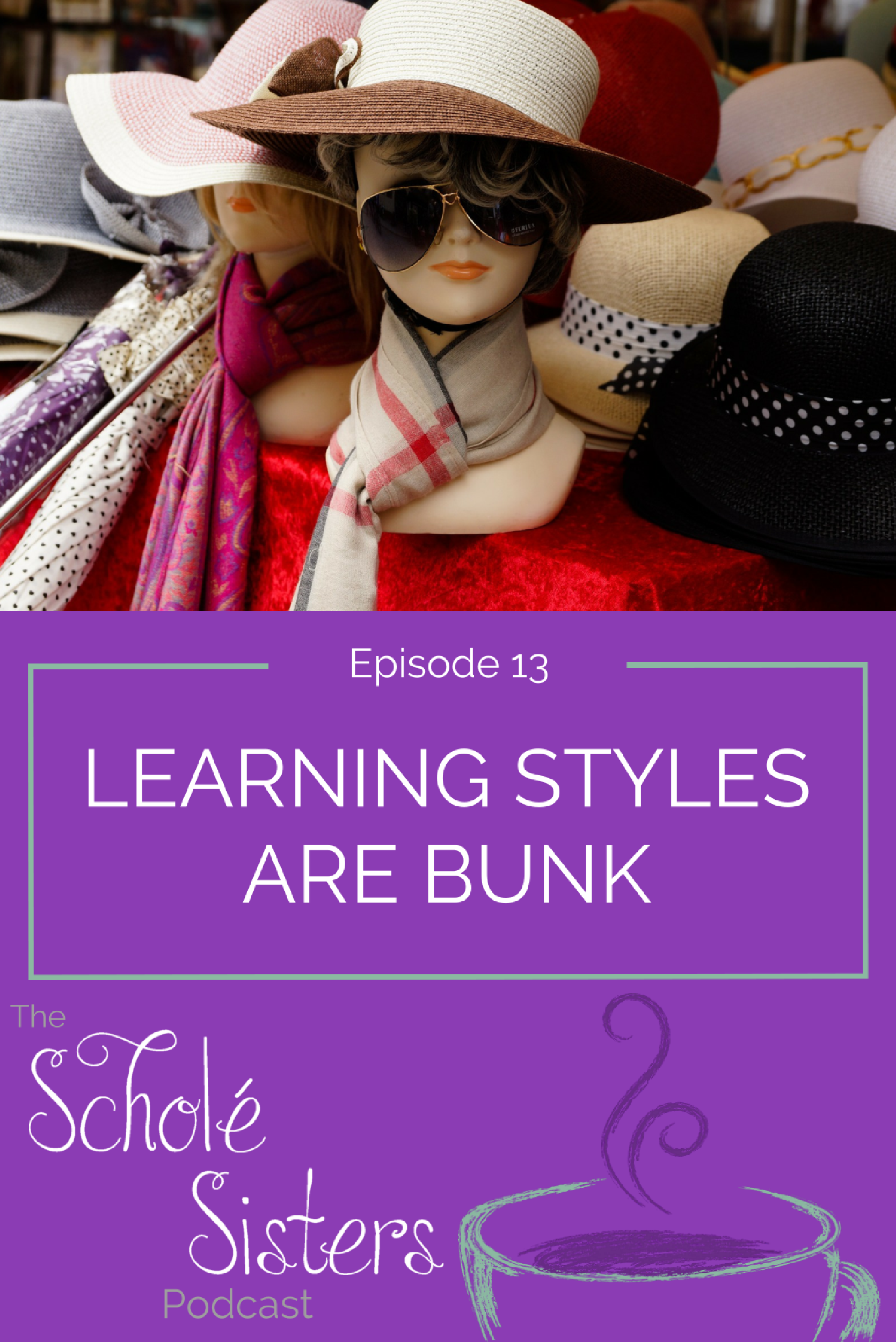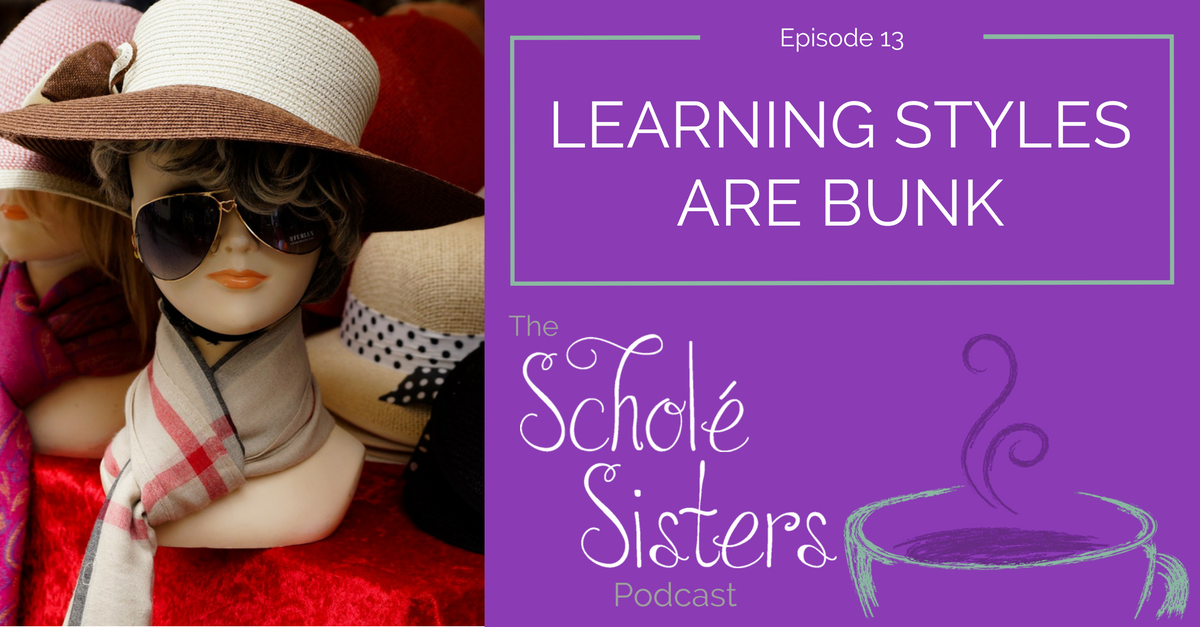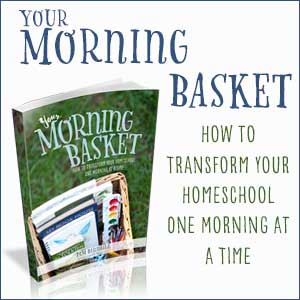SS #13: Learning Styles Are Bunk
On today’s show, Pam and Brandy discuss learning styles and the fact that there is no scientific evidence whatsoever to back them up. (Obviously, Pam is trying to get us into trouble.) But REALLY, it was a great discussion, even if somewhat controversial. Also, if you’ve ever wondered how learning styles intersect — or not — with the classical tradition, we manage to Go There.
In our Nitty Gritty Question, we also confess our regrets and do over desires in regard to early childhood education in our homes.

Thank you to our sponsor:
This episode is sponsored by Your Morning Basket. Your Morning Basket is a guide that shows you step-by-step how to add the practice of Morning Time and delight to your homeschool day. Check out the guide and the companion podcast at yourmorningbasket.com.
Listen to the podcast:
Podcast: Play in new window | Download
Show Notes:
- Scholé RDA:
- Pam:
- Your Morning Basket Podcast
Memorize the Faith by Kevin Vost
Memorize the Reasons by Kevin Vost
- Cindy = Cindy Rollins
Memorize the Mass by Kevin Vost
- Jenny Rallens’ CiRCE podcast episode on memory
- BBC Sherlock
- Brandy:
Norms and Nobility by David Hicks
- Pam:
- Topical Discussion: Learning Styles are Bunk
- Nitty Gritty Homeschool Question
Please leave us a review in iTunes!
If you don’t know how to do that, click here for illustrated instructions.
Scholé is the opposite of stress.








Very grateful for you both sharing your regrets with homeschooling in the early years. My little guys are 2 and 1 and I really take it to heart.
Also, I live about 30 miles south of Ambleside. I can attest that, even with the rain, it’s pretty easy to go outdoors most days, year round, and the wildlife certainly isn’t threatening.
It sounds lovely! Amazing, actually! I want to come visit. 🙂
We were just remembering today the time that our daughter was bitten by a poisonous spider … it was very scary for at least three weeks while we worked to get the venom under control. I’m so glad I didn’t let that make me want to keep her indoors because she has ended up being the family naturalist. 🙂
Loved listening to this. I wrote a post a few months ago at The Homeschool Post on learning styles, not as thoroughly fleshed out by far, and you guys have nailed this. Finishing up my M. Ed. courses the emphasis on learning styles about drove me mad. I really appreciated the other resources you mentioned in this podcast.
Brandy, I would like to know more about the spelling struggles and the effect picture study had on the spelling.
Yay!!! I’m commenting before I listen (silly and premature, I know), BUT I’m so excited that this is starting to come to light. As a tutor, I’ve always found, anecdotally, that there’s no basis for the concept of learning styles, but I think it’s been used as an excuse for too long!
I didn’t see that post, Blossom! If you want to share a link, I’m sure some of the folks around here would like to read it. 🙂
As far as the spelling goes, picture study didn’t solve the problem per se, but it solved the visualization issue, which helped immensely. This child went from copying letter for letter to to groups and sometimes whole words at a time. So…progress was made! 🙂
Rahime, you make me laugh! I would love to hear more of your thoughts after you listen. 🙂
I may ask this in the forums also, but what are your thoughts on Gardner’s multiple intelligences?
For reference:
https://www.edutopia.org/multiple-intelligences-research
One section of this says,
“The Difference Between Multiple Intelligences and Learning Styles
One common misconception about multiple intelligences is that it means the same thing as learning styles. Instead, multiple intelligences represents different intellectual abilities. Learning styles, according to Howard Gardner, are the ways in which an individual approaches a range of tasks. They have been categorized in a number of different ways — visual, auditory, and kinesthetic, impulsive and reflective, right brain and left brain, etc. Gardner argues that the idea of learning styles does not contain clear criteria for how one would define a learning style, where the style comes, and how it can be recognized and assessed. He phrases the idea of learning styles as “a hypothesis of how an individual approaches a range of materials.”
Everyone has all eight types of the intelligences listed above at varying levels of aptitude — perhaps even more that are still undiscovered — and all learning experiences do not have to relate to a person’s strongest area of intelligence. For example, if someone is skilled at learning new languages, it doesn’t necessarily mean that they prefer to learn through lectures. Someone with high visual-spatial intelligence, such as a skilled painter, may still benefit from using rhymes to remember information. Learning is fluid and complex, and it’s important to avoid labeling students as one type of learner. As Gardner states, “When one has a thorough understanding of a topic, one can typically think of it in several ways.””
You know, I have never really looked into it or the research, so commenting on it would probably be dangerous. With that said, I’ll do it anyhow. 😉
Just glancing at the link you gave, it sounds like it is drawing a bit on some of the IQ test theories from the 1940s, which are already established in the research. To my mind, the simplest thing to do would be to give a bunch of people the test — and I mean a whole lot of them — and then follow them for years and see what happens. With IQ research, this is why the tests have hung on — because high and low test scores prove consistent outcomes over time.
The quote you gave above is really interesting, I think. It could be that when people think they are identifying a learning style, they are simply seeing a processing strength in a certain area. I know that IQ tests today tend to include things like visual/spatial processing, auditory processing, and so on and so forth. I like the point made — that learning experiences do not have to relate to a person’s strongest area. That brings me back to the idea that this can even be dangerous, because we aren’t exercising the whole person…
In short, though: I don’t know! It’s very interesting!
I was thinking of Sherlock the whole time you were talking about the memory palace! I love the show…Pam you should definitely just watch the whole series ;).
Great podcast. I have always wondered about learning styles – so glad you approached this topic.
I have two children on the autism spectrum and all we heard for years was how they are visual learners. After six years, I take the stance that they are able and should (like Brandy mentioned) be “stretched” to learn in other ways. We have seen beautiful progress in gently giving opportunities to learn in ways that are not necessarily their favorites. It’s hard work, sometimes, like exercising, but how else will those areas grow? This is a big part of my push to raise the bar for special needs; when we manipulate subjects to fit into a specific “learning style” we sometimes lose so much in context and skills necessary to be successful.
Don’t get me wrong, I am all for providing supports (like moving in some way while reciting, etc.) BUT learning styles seem to be one more way modern education is pigeonholing our kids into neat little compartments instead of teaching to the whole child.
I would love to have you visit! We can go up to Ambleside and sneak onto campus 🙂 I was in the Lakes a few weekends ago and thinking that it was no wonder that Charlotte Mason was such an advocate for spending time outdoors. It’s very lovely.
Willingham addresses Gardner’s theory in his book “Why Don’t Students Like School?” I highly recommend it!
Ooh! Want to share a bit here about what he thinks? I’m very curious, and I don’t have his book. Well, I don’t have it YET. 🙂
I’m glad you brought up Gardner, Liz. I was surprised that his name didn’t come up. When I took Educational Psychology in college, his theory was the basis of much of our teaching about learning styles/preferences. In general, much of the criticism that you brought up in the podcast is similar to the the criticism of Gardner’s theory, so it doesn’t necessarily change the argument. Where I do find value in knowing my preferred method of learning is when I have a short amount of time and/or need to retain specialized information (like when I took my driver’s test as a teen, or am preparing for an interview at work and have a few specific data points I want to work in). I know what works best for me to commit those things to memory. In general though, I agree that for most people (I believe there may be situations with people who aren’t neurotypical where there are certain modes of learning that truly won’t work for them), learning how to take in information in a variety of modes only benefits you as a learner.
You mentioned some retention data in the podcast, which also turns out to be totally bunk. See: https://sites.google.com/site/thecorruptedconeoflearning/home
Well, that is certainly ironic! I tried to look it up, but I obviously had the wrong name for it. I will say it crossed my mind that I do not remember 90% of … well … anything! 😉
I’m almost done with my homeschooling, but I’m trying to mentor younger moms and this was very helpful. While my children all had preferred methods, I tried to use at least hearing and seeing in all of our subjects. Like Brandy, I struggle with comprehension in listening and have had to train myself over the years to be better at it. Taking notes helps but so does just plain old-fashioned paying attention (Charlotte Mason was so wise!). That gets easier when your children are older and more independent as you get more than 30 seconds at a time to think. 🙂
For spelling, we used the Spaulding method which required seeing, writing, and hearing all at once. That especially helped my non-speller because he could “build” his words using phonograms and spelling rules.
Keep up the good work and the great titles. I’m in the middle of The Living Page, which I never would have found without your podcast.
“Seing persons as humans…versus seeing persons as individuals…we’re continually breaking people apart…we’re not focused on our common humanity…so to be come fully human…we would use them all”
My favorite thought!!!
I am loving the podcast, even though I end up adding several books to my to-read list with each episode 😉
Pam mentioned a podcast(?) about spelling and it sounded like the possible missing link for my clever writer / bad speller. Could it be linked up? I’d so appreciate it.
Ooh! I can’t believe I forgot to put that in the notes! Let me ask Pam and get back to you. 🙂
https://iew.com/help-support/podcast/episode-103a-spelling-and-brain-part-1
or
https://iew.com/shop/products/spelling-and-brain-audio-download
for $3 ?
I pretty sure Pam was referring to the $3 talk. 🙂
For anyone who may not be familiar, the Mass your prisoner had memorized would have been the old Latin Mass which is significantly longer than the new Mass…and also in Latin… I was excited to see that the “Memorize the Mass” book includes both Masses! Very cool.
Thank you for sharing your wisdom about the early years of homeschooling. I also read a post that Mistie did that says essentially the same thing and assures moms of littles, that YES this stage is important and here are the important things you should do before getting academic:
https://www.simplyconvivial.com/2018/classical-education-first-grade/
Really enjoyed this podcast (as usual)!